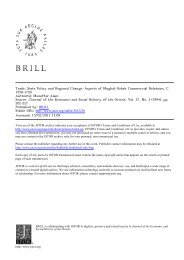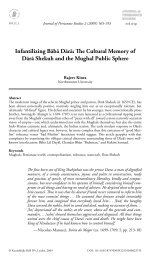The Mughals, the Sufi Shaikhs and the Formation of the Akbari ...
The Mughals, the Sufi Shaikhs and the Formation of the Akbari ...
The Mughals, the Sufi Shaikhs and the Formation of the Akbari ...
You also want an ePaper? Increase the reach of your titles
YUMPU automatically turns print PDFs into web optimized ePapers that Google loves.
FORMATION OF THE AKBARI DISPENSATION 163<br />
he believed he was blessed with a son who was named after <strong>the</strong><br />
Shaikh. 81<br />
By <strong>the</strong> 1570s, Akbar thus appeared as an exclusive devotee <strong>of</strong> <strong>the</strong><br />
Chishti saints, both dead <strong>and</strong> alive. In 1581, on his way to <strong>the</strong> Punjab<br />
he visited <strong>the</strong> khanqah <strong>of</strong> ano<strong>the</strong>r major Chishti saint <strong>of</strong> <strong>the</strong> period,<br />
Shaikh Jalal al-Din, in Thanesar. This visit is <strong>of</strong> special importance for<br />
us, since <strong>the</strong> gr<strong>and</strong> old shaikh was a noted khalifa <strong>of</strong> Shaikh ‘Abd al-<br />
Quddus Gangohi. Akbar was accompanied by <strong>the</strong> bro<strong>the</strong>rs Abu al-Fazl<br />
<strong>and</strong> Faizi. <strong>The</strong>y had a long conversation with <strong>the</strong> shaikh, discussed with<br />
him <strong>the</strong> secrets <strong>of</strong> Divine Realities <strong>and</strong> mystical sensibilities (haqa’iq<br />
wa ma’arif). <strong>The</strong> emperor, as <strong>the</strong> recorded memory in later Chishti<br />
tazkiras remember, was so impressed with <strong>the</strong> shaikh’s response that<br />
he even expressed a desire to give up kingship. <strong>The</strong> shaikh, however,<br />
dissuaded him from doing so. He is reported to have said:<br />
‘First you find a person who can match you <strong>and</strong> sit [on <strong>the</strong> throne] in your<br />
place, <strong>and</strong> <strong>the</strong>n come for this work (...). Your justice for an hour is better than<br />
<strong>the</strong> prayers <strong>of</strong> a thous<strong>and</strong> <strong>of</strong> saints. Piety <strong>and</strong> sainthood for you lies in your<br />
being just to God’s people (khalq-i Khuda) <strong>and</strong> in conferring benefits upon<br />
<strong>the</strong>m. Remember God. Kingship does not prevent you from remembering<br />
Him’. 82<br />
Did Akbar recognize <strong>the</strong> Chishtis <strong>the</strong>n as royal pirs <strong>The</strong>re is nothing<br />
in our sources to suggest an answer to this in <strong>the</strong> positive. What did<br />
Akbar expect a <strong>Sufi</strong> to be Which <strong>Sufi</strong>s did he like to be close to We are<br />
provided an answer to <strong>the</strong>se questions in <strong>the</strong> following remark by Abu<br />
al-Fazl on Mirza Sharaf al-Din’s revolt (which we have noticed above).<br />
This remark also supports <strong>and</strong> in a measure reiterates <strong>the</strong> reasons<br />
that were given above for <strong>the</strong> decline <strong>of</strong> <strong>the</strong> fortunes <strong>of</strong> Naqshb<strong>and</strong>is.<br />
He writes:<br />
It is an old custom for <strong>the</strong> divinely great <strong>and</strong> for acute rulers to attach to<br />
<strong>the</strong>mselves <strong>the</strong> hearts <strong>of</strong> dervishes <strong>and</strong> <strong>the</strong> sons <strong>of</strong> dervishes. And <strong>the</strong>y have<br />
exhibited this tendency, which is both an intoxicant which destroys men,<br />
<strong>and</strong> sometimes as a means <strong>of</strong> testing <strong>the</strong>ir real nature. If <strong>the</strong> matter be<br />
looked into with <strong>the</strong> eye <strong>of</strong> justice, it will be evident to <strong>the</strong> prudent <strong>and</strong><br />
awakened-hearts, that <strong>the</strong> favour shown by <strong>the</strong> Shahinshah to this fa<strong>the</strong>r <strong>and</strong><br />
son exhibited both motives. Accordingly <strong>the</strong> concomitants <strong>of</strong> His Majesty’s<br />
81 Richards, ‘Formulation <strong>of</strong> Imperial Authority’; Currie, <strong>The</strong>Shrine<strong>and</strong>Cult<strong>of</strong>Mu’in<br />
al-Din, pp. 99–102 <strong>and</strong> 152–4; Nizami, Akbar <strong>and</strong> Religion, pp. 104–5, 111 <strong>and</strong> 117.<br />
82 Muhammad Akram ibn Shaikh Muhammad ‘Ali ibn Shaikh Ilah Bakhsh, Sawati’<br />
al-Anwar, British Library, India Office Ms. Ethé 652 (I.O. Islamic 2705), fols. 389b-<br />
390b; ‘Abd al-Rahman Chishti, Mir’at al-Asrar, British Library, Ms. Or. 216.<br />
http://journals.cambridge.org Downloaded: 15 Feb 2011 IP address: 129.174.97.34






